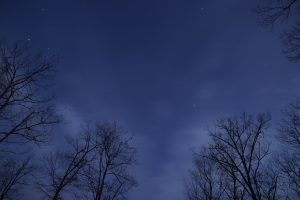
When was the last time you gazed up at the night sky? Were you identifying constellations or simply enjoying the view? The night sky has delighted and inspired artists and scientists for ages. Apollo astronaut Jim Lovell remarked, “The real friends of the space voyager are the stars. Their friendly, familiar patterns are constant companions, unchanging, out there.” Whether you’re gazing at the night sky from a space craft or from your own back yard, learn why preserving dark sky is important.
5 Reasons Preserving Dark Sky is Important:
1. Light pollution, the enemy of dark sky, causes increased energy consumption. According to the International Dark Sky Association (IDA), “Lighting that emits too much light or shines when and where it’s not needed is wasteful…In an average year in the U.S. alone, outdoor lighting uses about 120 terawatt-hours of energy, mostly to illuminate streets and parking lots. That’s enough energy to meet New York City’s total electricity needs for two years.”
2. Light pollution disrupts ecosystems and wildlife. The IDA says, “Plants and animals depend on Earth’s daily cycle of light and dark rhythm to govern life-sustaining behaviors such as reproduction, nourishment, sleep and protection from predators. Scientific evidence suggests that artificial light at night has negative and deadly effects on many creatures including amphibians, birds, mammals, insects and plants.”
3. Light pollution harms human health. Like most life on Earth, humans adhere to a circadian rhythm — our biological clock — a sleep-wake pattern governed by the day-night cycle. Artificial light at night can disrupt that cycle.
According to the National Institute of General Medical Sciences, “Circadian rhythms can influence sleep-wake cycles, hormone release, body temperature and other important bodily functions. They have been linked to various sleep disorders, such as insomnia. Abnormal circadian rhythms have also been associated with obesity, diabetes, depression, bipolar disorder and seasonal affective disorder.”
4. Light pollution affects crime and public safety. Both dark sky advocates and public safety officials argue that excessive light does nothing to deter crime and may, in fact, encourage it. According to the Crime Prevention Website, “Badly designed, poorly maintained and incorrectly installed external lights around the home can have detrimental effects on your neighbors’ lives and health, especially those ‘security’ floodlights that are often regarded as the panacea for all ills.”
5. Star gazing. Many people enjoy star gazing as a relaxing hobby. I argue that star gazing is of special importance for children. By sparking their sense of wonder about the universe we encourage their scientific curiosity, and maybe (just maybe) that curiosity leads one of them to become a future astronaut.
What can you do to protect dark sky?
The IDA has a list of helpful suggestions here.
As a land trust, we argue that another important way to preserve dark sky is through conservation. By conserving our natural landscapes we save it from the effects of light pollution. Our current fundraising campaign to Save Goat Hill will ensure that this patch of dark sky will be a safe haven for migrating birds, ecosystems, and star gazers for generations to come.
What are your favorite places to star gaze? Share your best spots on our Facebook page.
Related on 3rlt.org
Help Save Goat Hill!
image of night sky via pexels.com
